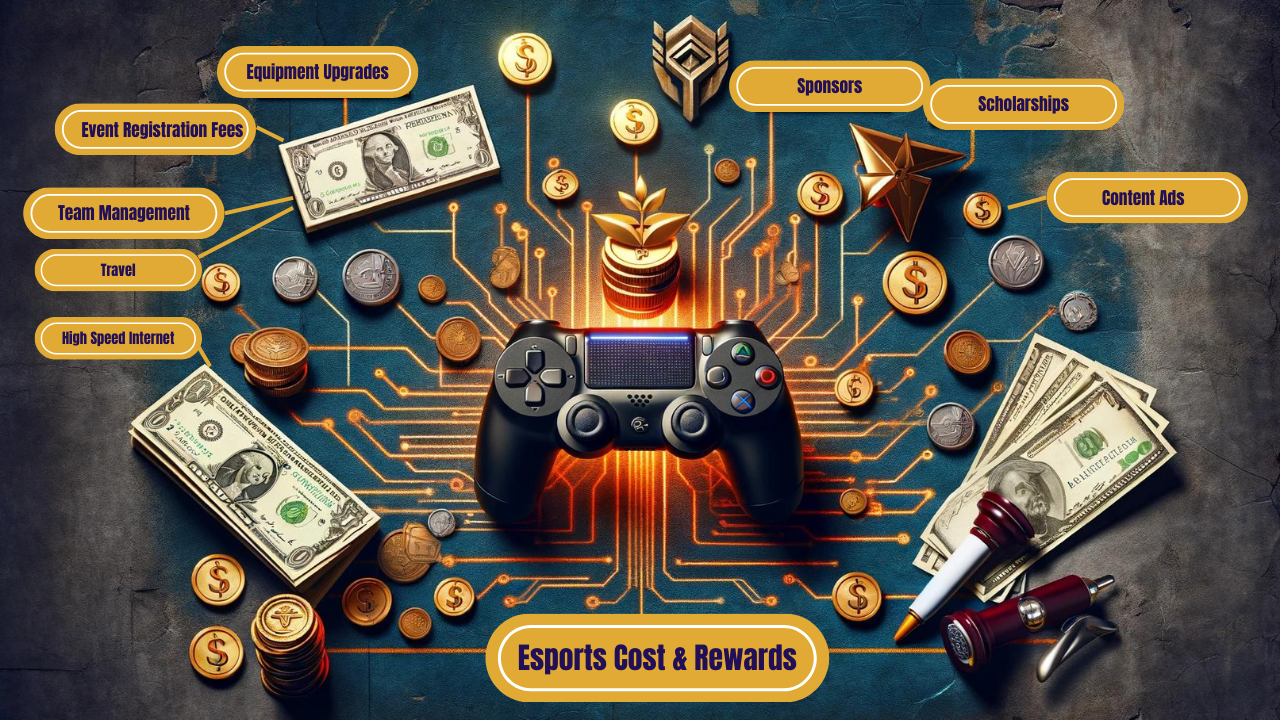
Everything You Need to Know About a Professional Esports Career
Key Takeaways
- Esports has grown into a viable career path with an increasing number of professional degrees and certificates in gaming, supported by grants and scholarships.
- Over 200 varsity esports college programs in the United States offer scholarships, reflecting the growing institutional support for esports.
- Universities worldwide now offer esports majors, degree programs, and full academic scholarships, further legitimizing esports as a career.
- The goal of some universities is to provide full video game scholarships to their gaming teams, indicating potential growth in this field.
Esports has broken the shackles of being just a pastime and has emerged as a respected career path with endless potential and opportunities. With the increasing number of professional degrees or certificates in gaming supported by grants and scholarships, it’s clear that esports isn’t just \”playing games\”—it’s a career that requires skill, strategy, and talent. The rise of esports career opportunities and job types is a testament to this.
The Rise of Esports as a Legitimate Career Path
Esports, once considered a niche and unconventional career path, has gained significant momentum and acceptance in recent years. This shift can be attributed to the increasing number of professional degrees or certificates in gaming, supported by grants and scholarships. A fact that signals the growing acceptance of esports as a viable career path. Majoring in Gaming is one such platform that provides grants and scholarships for those seeking a professional degree or certificate in gaming.
Further solidifying this acceptance is the fact that over 200 varsity esports college programs across the United States offer scholarships. This growing institutional support for esports is a clear indication that the field is not just a passing fad but a legitimate and respected career path. Universities such as Verizon are leading the charge in this area, with many offering esports scholarships.
But it’s not just in the United States where this change is happening. Universities worldwide are now offering esports majors and degree programs, as well as full academic scholarships for those wanting to pursue a career in esports. This further legitimizes esports as a career and opens up a whole new world of esports opportunities and job types. Fitgmr.gg gives an insight into how universities across the world are contributing to this shift.
The future goal of some universities is to provide full video game scholarships to their gaming teams. This not only indicates the potential growth in the field of esports but also signifies the recognition and importance given to esports by the academic world. This future goal is shared by universities such as Scholarships.com, which currently offers partial video game scholarships.
This rise in the acceptance of esports as a career path is also reflected in the growing number of universities that have added Esports to their athletic programs. These universities offer scholarships to talented gamers, further indicating the increasing recognition of esports as a sport. Game Industry Career Guide provides a comprehensive list of such colleges and universities.
The rise of esports as a legitimate career path is a testament to the evolving landscape of career opportunities and job types, and the growing acceptance of esports in the mainstream consciousness.
Exploring the Diversity of Esports Careers and Scholarships
The esports industry is a diverse ecosystem with a wide array of career opportunities and job types. These range from professional gaming to game development and marketing. Just as this industry’s career choices are varied, so too are the scholarships offered by different esports games.
Types of Esports Games Offering Scholarships
According to the Next College Student Athlete (NCSA), there are gaming scholarships available for a wide range of popular titles, including Multiplayer Online Battle Arena (MOBA) games like League of Legends (LoL) and Defense of the Ancients (DOTA) 2, first-person shooter games like Overwatch and Counter-Strike: Global Offensive (CS:GO), and even sports games like FIFA and Madden. This diversity in esports games offering scholarships indicates a wide range of opportunities in the field, further expanding the scope of career opportunities and job types.
Esports Scholarships vs Student Loans
Esports scholarships can be a better option than student loans for those looking to pursue a career in the gaming industry. These scholarships make college more affordable for students and families, thereby reducing the financial burden of education. In a world where higher education often comes with a hefty price tag, esports scholarships offer a financial lifeline to those passionate about making a career in esports.
Esports Scholarships: A Gateway to Diverse Career Paths
Esports scholarships open the door to various career paths in the gaming industry. They enable students to pursue their passion for gaming while simultaneously preparing them for a professional career in the industry. Whether it’s becoming a professional gamer, a game developer, an esports coach, or an esports marketing manager, these scholarships provide the necessary financial support and educational qualifications to make it happen.
Organizations Offering Esports Scholarships
Various organizations offer scholarships to support students pursuing degrees or certificates in gaming or esports. These scholarships provide the financial support necessary to turn your passion for gaming into a career. Organizations like the Next College Student Athlete (NCSA) and the Esports Scholarship Foundation are just a couple of examples of the many organizations that offer esports scholarships.
Potential Career Paths for Esports Graduates
Graduating with a degree in esports opens up a world of professional opportunities in the gaming industry. For instance, one of the potential career paths for esports graduates is becoming an Esports Marketing Manager. In this role, you would be responsible for promoting esports tournaments, managing sponsorships, and building the brand of a professional esports team. The diverse range of career opportunities and job types indicates the versatility of this field and the potential it holds for the future.
The world of esports is not just about playing games; it’s a diverse field with a wide variety of career opportunities and scholarships. As the industry continues to grow, so too do the opportunities for those looking to make a career in esports.
Unpacking the Economic Impact of Esports Careers
The global popularity of esports has ignited a revolution, not just in terms of career opportunities and job types, but also in terms of its economic impact. The esports industry has become a significant contributor to the global economy, paving the way for new job creation, regional economic growth, technological innovation, and societal development.
Revenue Generation in the Esports Industry
The esports industry has demonstrated substantial growth over the past few years, contributing significantly to global revenue. The industry’s revenue comes from various sources, including media rights, advertising, sponsorships, merchandise, and ticket sales, among others. This economic surge underscores the potential of esports careers, further solidifying the industry’s status as a major global economic player.
Job Creation in the Esports Industry
Esports careers offer a plethora of job types and opportunities, contributing to job creation across various sectors. From game development and event management to marketing, the demand for qualified professionals in these fields has skyrocketed with the rise of esports. This trend indicates a promising future for job seekers looking to merge their passion for gaming with their career aspirations.
Regional Economic Growth Through Esports
Regions hosting esports events also stand to gain economically. From increased tourism to heightened local business revenue, esports events can significantly boost a region’s economy. Hotels, restaurants, and local businesses benefit from the influx of visitors, which, in turn, stimulates the local economy. Therefore, it’s clear that esports careers not only impact individuals but can also positively influence regional economies.
Esports and Technological Innovation
Esports careers also contribute to technological innovation, driving advancements in gaming hardware and software. As the esports industry continues to grow, the demand for cutting-edge gaming technology does too. This range from high-performance gaming computers and consoles to state-of-the-art game development software. The esports industry’s contribution to technological innovation underscores its importance in driving economic growth and development.
Esports Careers and Societal Development
Finally, esports careers contribute to societal development. They promote essential skills like teamwork, strategic thinking, and digital literacy. By fostering these skills, the esports industry aids in preparing the future workforce for the digital age, thus contributing to societal development. Moreover, the esports industry’s emphasis on inclusivity and diversity promotes social cohesion, further demonstrating its societal impact.
In conclusion, the economic impact of esports is multi-faceted, touching upon global and regional economies, technological innovation, and societal development. It’s clear that the rise of esports has not only reshaped the gaming industry but also made a significant impact on the global economy.
Exploring the Social Impact of Esports Careers
The rise of esports careers has had a profound impact on society, ushering in a new era of inclusivity, diversity, and community engagement. Whether it’s promoting positive mental health, contributing to community development, enhancing educational opportunities, or shaping cultural norms, the influence of esports extends far beyond the gaming arena.
Promoting Inclusivity and Diversity
Esports careers are leading the charge in promoting inclusivity and diversity within the gaming community. By breaking down traditional barriers and opening doors for people of all backgrounds, esports is redefining the gaming landscape. This wave of inclusivity is creating a more diverse and accepting community, making esports not just a career, but a beacon for social change.
Boosting Positive Mental Health
Esports careers also have the potential to foster positive mental health. The thrill of competition, the joy of victory, and even the lessons learned from defeat can all contribute to stress relief and improved self-esteem. Moreover, the camaraderie among team members can provide a sense of belonging, further enhancing psychological well-being. Thus, esports offer more than just job opportunities—they offer a platform for personal growth and emotional resilience.
Contributing to Community Development
Esports also contribute to community development, both online and offline. The creation of gaming clubs and online communities fosters a sense of unity and engagement among gamers. These platforms offer a space for gamers to connect, collaborate, and learn from each other, fostering a vibrant and dynamic community. The ripple effects of these communities can lead to broader societal engagement, highlighting the unique role of esports in community development.
Enhancing Educational Opportunities
The rise of esports careers has also led to significant advancements in educational opportunities. Institutions worldwide now offer scholarships and degree programs in gaming, thus recognizing and encouraging academic pursuit in this field. This not only makes education more accessible for aspiring gamers but also legitimizes esports as a field of study. Hence, the impact of esports careers extends into the realm of academia, shaping future generations of gaming professionals.
Shaping Cultural Development
Finally, esports careers contribute to cultural development by promoting gaming as a form of art and entertainment. The intricate storyline of each game, the strategic gameplay, and the immersive visuals all contribute to the gaming experience, transforming it into a form of interactive art. This cultural shift is redefining societal norms and perceptions, further demonstrating the transformative power of esports.
From promoting inclusivity to shaping cultural norms, the social impact of esports is both profound and far-reaching. As the esports industry continues to grow, its influence on society is likely to deepen, marking a new era in the gaming industry and beyond.
Forecasting the Future of Esports Careers
As we navigate through the digital age, esports careers continue to carve out a unique position within the global economy. The future holds immense potential, with growth areas emerging and trends evolving in this dynamic industry. From technological advancements to societal shifts, let’s delve into what the future might hold for esports.
Emerging Trends and Growth Areas
The esports industry is fast-paced and ever-evolving, offering a plethora of future career opportunities. With the global esports market expected to surpass $1.79 billion by 2022, the potential for growth is immense. New trends such as the rise of mobile gaming, the integration of blockchain technology, and increased corporate sponsorship present exciting opportunities for those pursuing a career in this field.
Technological Advancements
Driven by innovation, the future of esports careers will undoubtedly be shaped by technological advancements. Developments in virtual reality and artificial intelligence are revolutionizing the gaming experience, offering unprecedented levels of immersion and interactivity. These advancements not only enhance the gaming experience but also open up new avenues for job roles within the industry, ranging from VR game developers to AI specialists.
Challenges and Opportunities
Like any industry, esports faces its share of challenges and opportunities. Regulatory issues such as fair play, player rights, and data privacy need to be addressed to ensure the industry’s sustainable growth. Market competition, while a challenge, also presents opportunities for innovation and differentiation. As the industry matures, those who can navigate these complexities will find great prospects in the ever-expanding world of esports.
Responding to Societal Changes
Esports careers are also poised to evolve in response to societal changes. Shifts in consumer behavior, as well as changing cultural attitudes towards gaming, will shape the future of the industry. As gaming becomes more mainstream and socially accepted, the stigma associated with pursuing a career in esports is likely to diminish, further boosting the industry’s growth.
Contributing to Global Development
Finally, esports careers have the potential to contribute significantly to global development. By promoting digital literacy and technological innovation, esports can play a key role in preparing the workforce for the digital age. Furthermore, the proliferation of esports scholarships, which can be a more affordable option than traditional student loans, is making higher education more accessible to a diverse range of students. This not only broadens the talent pool within the esports industry but also contributes to social mobility and economic development.
As we look towards the future of esports, it’s clear that the opportunities are boundless. As the industry continues to evolve, it will undoubtedly continue to shape the economic, social, and cultural landscapes of our digital world.
Other Articles You May Find Interesting




Get Social